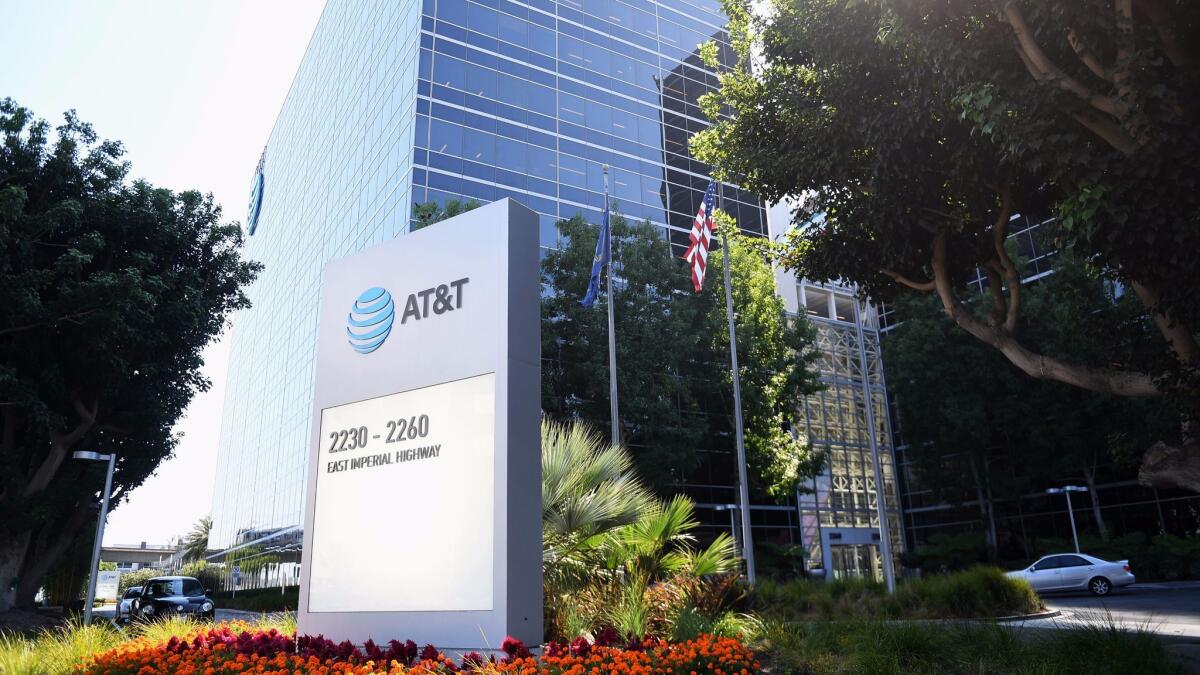Justice Department sues to block AT&T’s purchase of Time Warner, which vows a fight

The U.S. Department of Justice has sued to block AT&T’s proposed $85-billion purchase of Time Warner Inc. — one of the largest media mergers in American history — arguing that a bulked-up AT&T would stifle competition and lead to higher prices for consumers.
“This merger would greatly harm American consumers,” Assistant Atty. Gen. Makan Delrahim of the department’s Antitrust Division said Monday in a statement. “It would mean higher monthly television bills and fewer of the new, emerging innovative options that consumers are beginning to enjoy.”
But the lawsuit, which was filed Monday evening in U.S. District Court in Washington, sets the stage for a high-stakes showdown and immediately fueled questions about whether President Trump was using the nation’s top law enforcement agency to settle scores with perceived rivals.
Trump has made no secret of his animosity toward CNN, which is owned by Time Warner Inc. and is one of the media assets that AT&T wants to buy. Trump frequently refers to CNN as “fake news” on Twitter, and as recently as last week he punctuated a tweet about CNN with the word “Loser!”
A high-level Justice Department official Monday denied the claim, instead suggesting that AT&T was invoking Trump to divert attention from the merger’s problems.
“I can understand why merger parties want to try to kick sand in the umpire’s eyes but we are law enforcement,” this person, who did not want to be identified discussing the department’s strategy, said in a briefing call with reporters. “We have to go to court and we will prove our case.”
The lawsuit could damp the frenzy of media mergers. Traditional companies, including AT&T, have been racing to consolidate to better compete against tech giants Google, Facebook, Netflix and Amazon.com, which have upended traditional TV. Comcast Corp. and Sony Pictures Entertainment are circling Rupert Murdoch’s 21st Century Fox.
Analysts said it is unprecedented for the government to try to block this type of combination. And AT&T said the government was overreaching.
“We are surprised to be here and candidly are quite troubled by it,” Randall Stephenson, AT&T’s chairman and chief executive, said Monday at a news conference. “We have no intention of backing down…. We are in it to win.”
The 132-year-old phone company has pursued the deal as a way to transform itself into a 21st-century entertainment powerhouse now that growth has stalled in phone service and pay TV.
The merger would bring together the nation’s second-largest phone company and largest pay-TV provider with the company behind TV shows “Game of Thrones” and “The Big Bang Theory” and the Harry Potter films. Time Warner’s assets include HBO, TBS, TNT, Cartoon Network and the Warner Bros.’ movie and TV studio in Burbank.
AT&T plans to argue that the lawsuit veers wildly from established legal precedent.
“Fortunately, the Department of Justice doesn’t have the final say in this matter,” David R. McAtee II, AT&T’s general counsel said in a statement. “Rather, it bears the burden of proving to the U.S. District Court that the transaction violates the law. We are confident that the court will reject the government’s claims and permit this merger.”
Legal experts say the Justice Department’s case looks shaky. The division typically has challenged mergers only when there is a clear-cut case that consumers will be harmed. The Justice Department had hoped that several state attorneys general would join in the lawsuit, but so far none have signed on.
“It’s going to be an uphill battle for the DOJ,” said Scott C. Solberg, a partner in the antitrust division of Eimer Stahl, a Chicago law firm. “It’s going to be very challenging, particularly when AT&T has been given this gift of Trump’s comments. They have the ability to go into court and scream foul.”
AT&T has hired prominent Los Angeles litigator Daniel Petrocelli to handle the case, which could go to trial within two months.
When asked during a news conference whether AT&T would demand communications between the White House and the Justice Department, Petrocelli was noncommittal.
“Things have a way of coming out ... and if it does, it will not bode well for the government,” Petrocelli said.
Solberg, the Chicago lawyer, said the politically charged atmosphere and Trump’s comments about CNN will help AT&T.
“AT&T can argue that the DOJ has been weaponized to do Trump’s bidding,” Solberg said.
Even as a presidential candidate, Trump voiced his opposition to the deal when it was announced in October 2016. At the time, he said his administration would block a merger between the two behemoths, saying the deal would concentrate too much “power in the hands of too few.”
After becoming president, Trump has frequently bristled when CNN has shined a harsh light on him, his administration and the investigation into Russian meddling in the 2016 election.
The Justice Department has sued to block mergers before but challenges to “vertical” mergers, in which the two companies do not directly compete in their main lines of business, are rare. The proposed AT&T-Time Warner marriage is considered a vertical merger because AT&T primarily offers phone service while Time Warner creates movies and TV shows.
The DOJ has not successfully blocked a vertical merger in court in nearly 50 years — not since the Nixon administration. The last time the government tried to challenge a vertical merger in court was during the Carter years, and the Justice Department lost that case, AT&T said.
Regulators have taken a harder line on so-called horizontal mergers, in which companies have overlapping businesses. For example, a lawsuit filed by the Justice Department in 2011 led AT&T to abandon a plan to buy competitor T-Mobile USA.
In negotiations with AT&T, the Justice Department had suggested that AT&T sell off Turner Broadcasting, which includes CNN, or unload AT&T’s DirecTV unit. AT&T refused.
Consumer analysts and some politicians for months have lobbied the Justice Department to prevent the AT&T-Time Warner tie-up because of fears that AT&T would abuse its power to gain an unfair edge over rivals.
In its 23-page lawsuit, the Justice Department agreed that the combination would lead to higher prices for traditional pay-TV subscriptions and would thwart the expansion of low-cost streaming services that threaten AT&T’s existing businesses.
The Dallas-based telecommunications company boasts 25 million pay-TV subscribers through its El Segundo-based DirecTV and U-Verse service. It also serves more than 100 million mobile phone customers.
AT&T has been on a buying binge. It spent $49 billion two years ago to buy DirecTV to expand its reach into television distribution. Now, AT&T is determined to own content because it anticipates that viewers will increasingly watch news and entertainment on mobile phones and tablets.
For months, the company confidently predicted that it would finalize its Time Warner takeover by year’s end. It lined up the financing it needed to complete the transactions and secured approvals from foreign regulators, including Brazil and Mexico. It also announced that a senior AT&T executive, John Stankey, would run Time Warner after the merger.
“It felt like it was headed on a good path,” Stephenson said.
The picture changed when the U.S. Senate in late September approved Trump’s pick of Delrahim to lead the antitrust division.
The lawsuit signals a shift for the department. During the Obama administration in 2011, the agency approved a similar vertical consolidation by allowing Philadelphia cable giant Comcast Corp. to buy NBCUniversal.
The Justice Department said the proposed AT&T-Time Warner merger was three times larger than the Comcast-NBCUniversal transaction. The lawsuit said AT&T could “use its control of Time Warner’s popular programming as a weapon to harm competition.”
Twitter: @MegJamesLAT
UPDATES:
6:45 p.m.: This article was updated with additional commentary.
3:25 p.m.: This article was updated to include reaction from AT&T.
2 p.m.: This article was updated to include details about the Justice Department’s lawsuit and AT&T’s response to the suit.
This article was originally published at 1:30 p.m.
More to Read
Inside the business of entertainment
The Wide Shot brings you news, analysis and insights on everything from streaming wars to production — and what it all means for the future.
You may occasionally receive promotional content from the Los Angeles Times.







